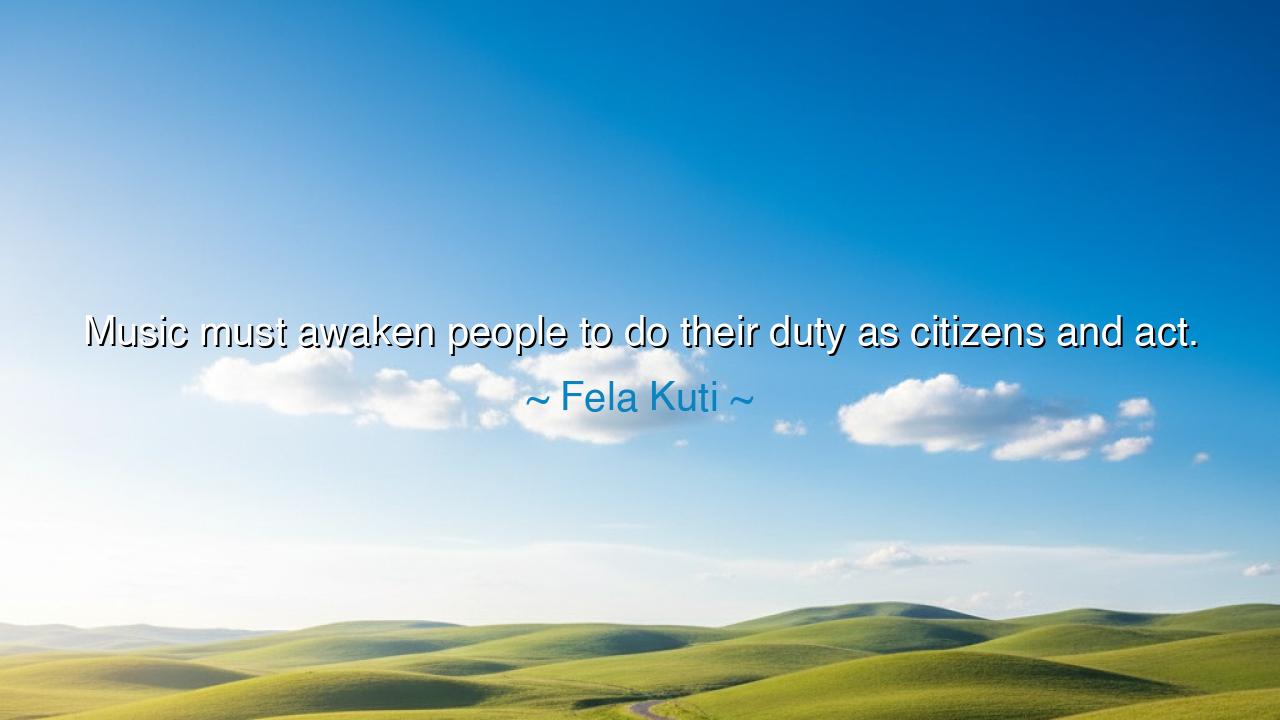
Music must awaken people to do their duty as citizens and act.






“Music must awaken people to do their duty as citizens and act.” Thus spoke Fela Kuti, the fiery prophet of Afrobeat, whose songs thundered not merely to entertain but to rouse a sleeping people. His words cut through the veil of illusion, declaring that music is not only for dance or pleasure—it is a weapon, a beacon, a trumpet blast calling men and women to their duty. For in the sound of drums and horns, in the chant of voices, lies the power to shake the foundations of oppression and to stir the hearts of citizens toward courage and action.
The ancients, too, knew this truth. They called upon music in times of battle, sounding horns to awaken warriors and to summon them to arms. They used chants and hymns in times of worship, awakening not only the body but the spirit to its highest purpose. In every age, music has been more than sound—it has been a call to rise, to remember, to act. Fela, in his wisdom, claimed this heritage, declaring that the artist must not merely soothe, but must awaken, like a rooster calling dawn upon a sleeping world.
In his own life, this truth burned with fire. Fela Kuti lived in Nigeria under regimes of corruption and violence. He might have chosen to sing only of love or celebration, but instead he poured the fire of truth into his Afrobeat rhythms. His songs like Zombie and Coffin for Head of State were daggers of sound, mocking the powerful, exposing their lies, and urging his people to reclaim their dignity. He paid the price—arrested, beaten, his home raided. Yet still he sang, because he believed music was sacred not when it lulled men into sleep, but when it awakened them into action.
History gives us other examples of this power. Think of the freedom songs of the American civil rights movement: We Shall Overcome and A Change Is Gonna Come. These were not written for idle enjoyment; they were battle hymns of the oppressed, lifting weary souls and giving courage to march into danger. Or recall the French Revolution, when the Marseillaise was sung not in theaters but in the streets, igniting the hearts of ordinary citizens to overthrow tyranny. In every era, music has been the spark that kindled movements.
The lesson is mighty: if you are an artist, remember that your work has power beyond entertainment. It can awaken, inspire, and guide people toward their higher duty. And if you are a listener, do not treat music as background noise alone. Hear the words, feel the rhythm, let them remind you of your role as a citizen of your land and of humanity itself. For a sleeping people cannot be free, but an awakened people cannot be enslaved.
O children of tomorrow, do not let your ears grow dull. Listen for the songs that stir your conscience. Seek out the voices that do not flatter you, but challenge you. And when the call of music ignites your heart, do not sit still—rise, act, fulfill your duty as a guardian of justice and truth. For music alone cannot change the world, but it can awaken those who will.
In practice, this means supporting artists who speak truth, creating art that stirs action, and allowing yourself to be moved by songs of courage. Let music remind you that you are not only an individual but a citizen, with a responsibility to your people, your land, and the generations to come.
Thus the words of Fela Kuti endure: “Music must awaken people to do their duty as citizens and act.” They are a torch passed from one age to another. Take it into your own hands, and let the sound of truth awaken you—not to slumber, but to action. For when music calls, the soul must answer, and the world itself begins to change.






AAdministratorAdministrator
Welcome, honored guests. Please leave a comment, we will respond soon